Is Consumer Non-Durables a Good Career Path? Different things we buy have a life span—some goods we use over a few years, others we use only once or twice. We make the classification of consumer durables and consumer non-durables based on use on a time length.
But how do these types of products influence your career?

Several consumer non-durable companies have become household names. We see and hear about them almost every day.
This list of companies includes Coca-Cola, Unilever, Pepsico, Procter & Gamble, and Nestle AG. As you can see, these are among the most prominent corporations worldwide.
Most people would want to work for such giant companies. But is consumer non-durables a good career path? If you want an answer to this question, you're in the right place.
Here is what we will talk about. The table of contents below will help you jump to the section you want right away:
- Is Consumer Non-Durables a Good Career Path?
- Consumer Non-Durables Career Path: The Pros and Cons
- What Are Consumer Non-Durables?
- Difference between Consumer Durables and Non-Durables
- Is Consumer Non-Durables a Good Career Path for Students?
- Consumer Non-Durables Career Path for Newly Graduates
- Is Consumer Non-Durables a Good Career Path for Marketers?
- Top 10 Companies in Consumer Non-Durables
- Job Opportunities
- Types of Jobs
- Job Positions
- Job Competition
- Average Salary & Bonus
- Benefits and Perks
- Work Culture
- Top Paying Jobs in Consumer Non-Durables
- Is Consumer Non-Durables a Good Career Path? Make a Conscious Decision.
- Is Other Consumer Services a Good Career Path?
Here, we will discuss the nature of employment opportunities in the consumer non-durables.
But before diving into it, let's first discuss consumer non-durables! We will also discuss how they differ from consumer durables—thinking of starting a consumer non-durables career? Read on!
Is Consumer Non-Durables a Good Career Path?
Without further ado, is consumer non-durables a good career path?
Yes, consumer non-durables is a good career path due to several reasons. It offers numerous job opportunities, has a culturally diverse environment, is a consumable item, and is always in demand, among other reasons.
We will explore all the reasons further in this article. To give a brief list, here are some unquestionable motives.
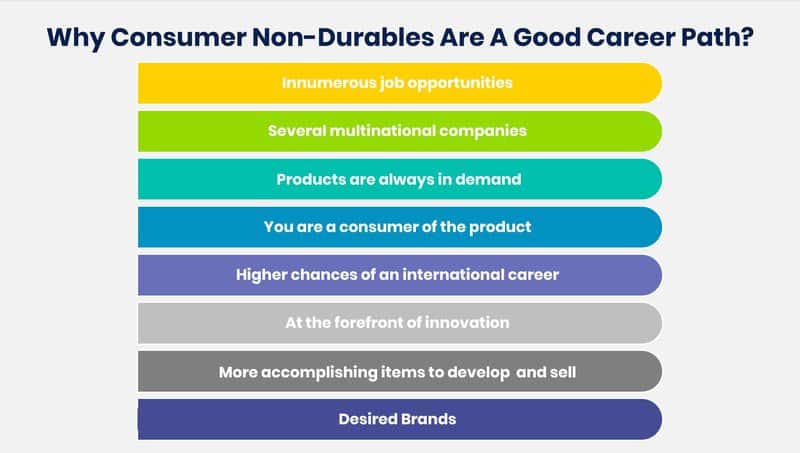
- Innumerous job opportunities.
- Several multinational companies are in the market, generating a culturally diverse environment.
- It's a consumable item, such as food or cleaning products, so it's always in demand.
- You are a product consumer, making it more pleasant to work with and understandable.
- As mentioned above, it's an industry of multinational companies, so the chances you have an international career are high.
- Non-durable consumer goods are trend-influenced, they need to be at the forefront of technology and consumer needs, so it's a good company to learn how to be at the top of innovation.
- It's a physical item that gives you a positive feeling when you see a clear sale from a product developed due to your work. Some say it's more accomplished than banking or life insurance, where the products are abstract.
- Many lived and desired brands are part of this industry. Should we mention Nike and Coca-Cola, for example? This influences the overall perspective of a dream job.
Many other reasons can be listed here. As we are just starting, let's show you some facts, and you can create your own opinion at the end of the article.
Consumer Non-Durables Career Path: The Pros and Cons
Are you considering a career in the consumer non-durables industry but wondering about the potential pros and cons? Look no further than this section.
Consumer non-durables, such as food, toiletries, and cleaning supplies, are typically used up or have a short lifespan. While there are benefits to pursuing a career path in this field, there are also some potential drawbacks to keep in mind. We’ll explore both sides of the equation so that you can decide whether a career in consumer non-durables is right for you.
The Pros of a Career in Consumer Non-Durables
A career in consumer non-durables has numerous benefits that entice those interested.
For starters, the industry is typically stable and resilient during tough economic times, as consumers will always need products such as food and hygiene supplies regardless of the state of the economy.
Additionally, there are ample opportunities for growth within companies in this sector and plenty of room to move into management positions with higher salaries.
Another significant pro associated with working in consumer non-durables is the variety of roles available. From marketing to sales to product development, there are many areas for professionals to specialize in based on their interests and skill sets.
This diversity allows for a fulfilling career path where individuals can continually learn new things while still contributing valuable expertise to their respective organizations.
Overall, careers in consumer non-durables offer job stability and exciting growth possibilities – perfect for anyone who values security and challenge in their professional life.
The Cons of a Career in Consumer Non-Durables
One major con of a career in consumer non-durables is the industry's highly competitive nature. With so many companies vying for market share, it cannot be easy to stand out and find success.
Additionally, there are often tight profit margins in this field, meaning that even small fluctuations in demand or production costs can significantly impact profitability.
Another potential downside to working in consumer non-durables is the emphasis on cost-cutting measures.
To remain competitive, many companies must find ways to reduce expenses wherever possible – whether through outsourcing labor or using cheaper materials – which can lead to ethical concerns about sustainability and fair labor practices.
Overall, while a career in consumer non-durables may offer exciting opportunities for growth and innovation, it's essential to consider these potential challenges before deciding to enter the industry.
Is Consumer Non-Durables a Good Career Path for Students?
Consumer non-durable companies are recognized to have outstanding internship programs. Unilever, for example, presents its internship program within 5-6 months duration and 32 hours per week, besides being a paid program.

After the internship, a few steps are required to get hired. So starting as an internal and developing a career in this multinational is a reality.

After you graduate, it's crucial to understand the consumer non-durable industry career. Let's take a look at another example, Procter & Gamble.
Is Consumer Non-Durables a Good Career Path for Newly Graduates?
New graduates have special needs other than experienced professionals, which are training and career development. Companies such as Procter and Gamble have excellent training and professional development programs.
Procter and Gamble affirm that 11,400 global c-suite executives have started their careers there. They also state that over 99% of their senior leaders are produced inside the company.
They focus their leadership program on three pillars and each pillar is linked:
- Leadership Opportunities
- Easy access to the company's leadership
- World calls training
The company creates confidence and develops the skills, networks, and knowledge employees need to succeed.
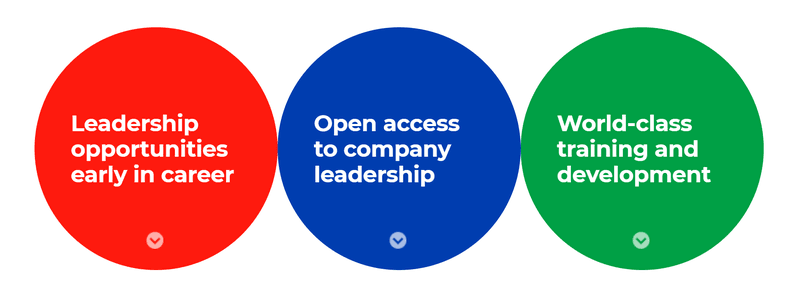
Their training is focused on hands-on experience:

Now, it's time to understand better consumer non-durables and how they differentiate from consumer durables.
Is Consumer Non-Durables a Good Career Path for Marketers?
If you're a marketer seeking a career path that resonates with your talents and interests, consumer non-durables might just be the perfect fit for you. This dynamic industry offers an enticing blend of challenges and opportunities that can lead to both professional achievement and personal fulfillment.
The world of consumer non-durables is filled with excitement and innovation, making it an ideal playground for creative marketers. Whether it's cosmetic products, food items, or fashion accessories, there is always something new to captivate consumers' attention.
By working in this sector, you'll have the opportunity to tap into your artistic flair while leveraging your marketing skills to create compelling campaigns that resonate with target audiences.
Furthermore, embracing the challenges of the consumer non-durables industry allows marketers to truly understand consumer behavior on a deeper level.
With each product launch or campaign strategy tailored specifically for fast-moving consumable goods, marketers gain valuable insights into customers' purchasing habits and preferences. This understanding can provide a solid foundation for building successful long-term strategies that help brands stand out in a competitive market.
If you're looking for a fulfilling career as a marketer where creativity meets consumer insight, Consumer Non-Durables presents an excellent pathway toward professional success.
Navigating the Challenges and Opportunities in Consumer Non-Durables Marketing
In this fast-paced industry, professionals must possess not only a comprehensive understanding of consumer behavior but also the ability to adapt to ever-evolving market trends.
The challenge lies in creating effective strategies that resonate with consumers, who are constantly bombarded with choices and information. However, within these challenges lie immense opportunities for career growth and success.
Consumer non-durable marketing offers marketers a chance to tap into various sectors such as food products, personal care items, household goods, and more. This breadth allows professionals to work on diverse product lines and hone their skills in different areas of expertise. Furthermore, as global markets expand rapidly, it presents an opportunity for marketers to cater to a wider range of consumers across borders.
Embracing the challenges and opportunities in consumer non-durable marketing requires empathy toward consumers' needs and desires. By thoroughly understanding customers' preferences through surveys or focus groups, marketers can create compelling marketing campaigns that connect with them on a deeper level.
Additionally, adopting innovative technologies like social media platforms or e-commerce can enhance brand visibility and customer engagement.
What Are Consumer Non-Durables? How Are They Different From Consumer Durables?
Consumer non-durables are goods that we use up in a short time. They are either for one-time use or are consumed for a few uses. As a result, one needs to buy these products again and again. Non-durables are also known as soft goods and consumable goods.
Examples of non-durables
If you're considering a career in consumer non-durables, it's important to understand exactly what products are considered non-durables. Examples include food items like fresh produce and packaged snacks, toiletries like shampoo and toothpaste, and cleaning supplies like bleach and paper towels. These products have a relatively short lifespan or will be used up entirely within a few uses.
Other examples are clothing, food products, and light bulbs. Non-durables are the opposite of consumer durables when it comes to consumption, and people can use them over a long period (considered to be over three years).
Consumer non-durables form a significant part of a country's economy and are stable figures in an economy. After all, non-durables include necessary goods that never go out of demand. In comparison, durable goods are subject to the business cycle.
In What Ways Are Durables and Non-Durables Different?

- During economic growth, the purchase of durable goods is likely to increase. In comparison, you will see no increase in the sales of non-durable goods. Why does this happen? It is because non-durables include necessary goods like groceries. As a result, consumers buy the same amount of non-durables as they do at regular times.
- Consumers do not purchase the same amount of durable goods during economic crises. In contrast to a steep decline in automobile sales during a recession, a recession does not affect the non-durable goods industry as much.
- Economic changes affect the sales of durable goods, and as a result, people see them as reliable economic indicators.
- Consumer non-durables are more into branding, while durables are into product development. On the other hand, the presence of off-brand products is higher in non-durables.
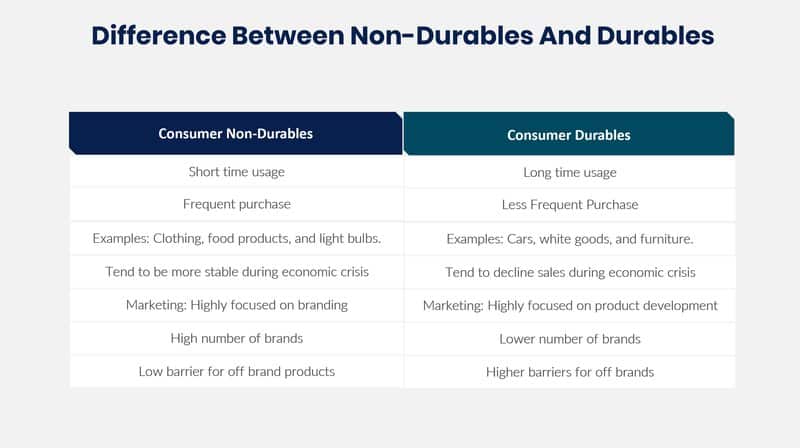
As we saw, consumer non-durables are a stable figure in an economy. And stability is a factor that you should consider when looking for jobs.
You must ask, is consumer non-durables a good career path? Let's find out if it is a good career option or not.
First, let’s look at the companies that play in this market.
Top 10 Companies in Consumer Non-Durables
Multinational companies and leaders in the fast-moving consumer goods sector (FMCG) are probably the places where you can find the majority of available job positions and the most significant possibilities for career growth.
If you want to start a career path in non-durable consumer goods, we list the ten leaders in the sector based on market cap. You can always check this article to find more companies in the consumer non-durables industry.
- Nestle AG
- Procter & Gamble Company
- L'oreal
- Nike
- Coca-Cola Company
- Pepsico
- Philip Morris International
- Unilever Group
- Christian Dior
- Anheuser-Busch InBev
1) Nestle AG
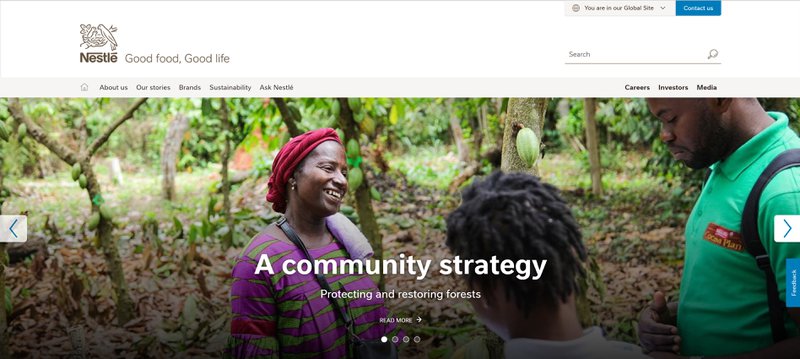
Nestle AG is a consumer non-durable goods company with more than 2000 brands present in 191 countries. It is the world's largest food and non-alcoholic beverage company in Switzerland. Overall figures:
- Market Cap (Sep-01-2021): 348.550 Billion USD
- Annual Revenue in USD: 92,301 Million USD (Year Ending: Dec-2020)
- Annual Net Income in USD: 13,242 Million USD (Year Ending: Dec-2020)
- Number of Employees: 291,000 (December 2019)
2) Procter & Gamble Company
Procter & Gamble Company has its headquarters in the USA. It has a diverse mix of cateries such as Fabric Care, Feminine, Hair, Baby, Family, Home, Grooming, Personal Health Care, Oral Care, Skin, and Personal Care Products.
- Market Cap (Sep-01-2021): 345.770 Billion USD
- Revenue: 70,950 Million USD (Year Ending: Jun-2020)
- Net Income: 13,030 Million USD (Year Ending: Jun-2020)
- Number of Employees: 99,000 (As of 2020)
3) L'oreal
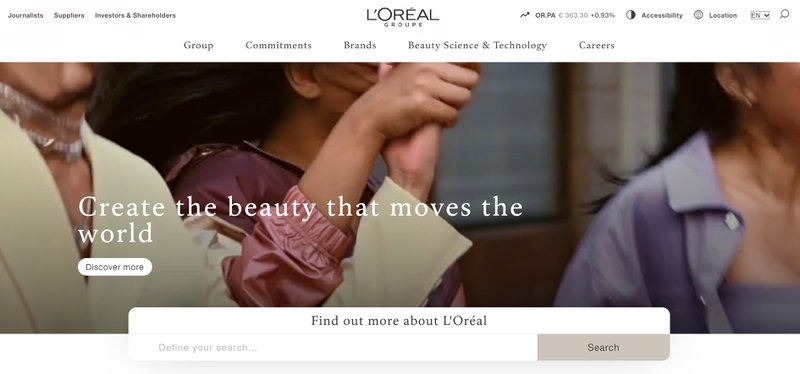
L'Oreal is a French company that manufactures and commercializes Cosmetics and Beauty Products. The company owns 36 brands across 150 countries.
- Market Cap (Sep-01-2021): 262.430 Billion USD
- Annual Revenue: 33,028 Million USD (Year Ending: December 2020)
- Annual Net Income in USD: 4,172 Million USD (Year Ending: December 2020)
- Number of Employees: 88,000 (As of December 2019)
4) Nike
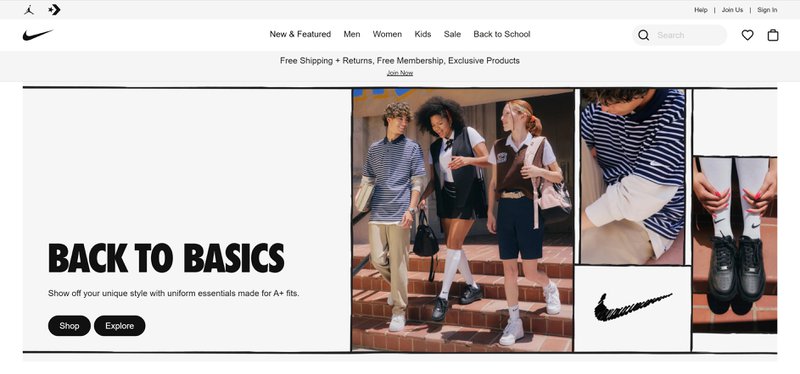
Nike is a North American company, one of the most known brands globally, manufacturer of shoes, footwear, and sportswear products.
- Market Cap (Sep-01-2021): 260.800 Billion USD
- Annual Revenue in USD: 37,420 Million USD (May 2020)
- Annual Net Income in USD: 2,530 Million USD (May 2020)
- Number of Employees: 75,400 (2020)
5) Coca-Cola Company
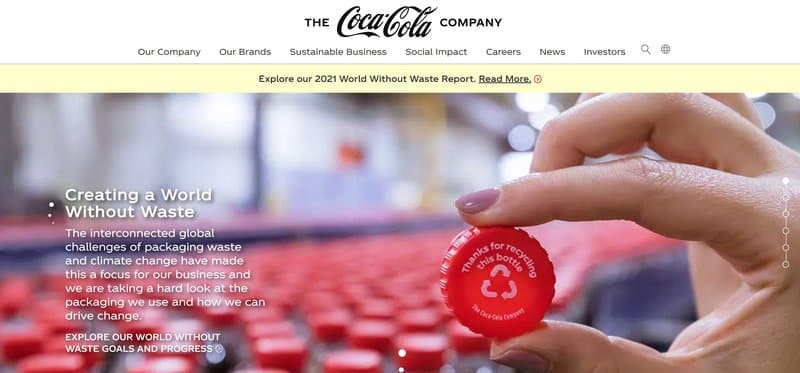
Coca-Cola is a North American company, manufacturer of Non-Alcoholic Beverages, and one of the most well-known brands in the world.
- Market Cap (Sep-01-2021): 243.070 Billion USD
- Annual Revenue: 33,010 Million USD (Dec-2020)
- Annual Net Income: 7,750 Million USD (Dec-2020)
- Number of Employees: 86,200 (in 2019)
6) Pepsico
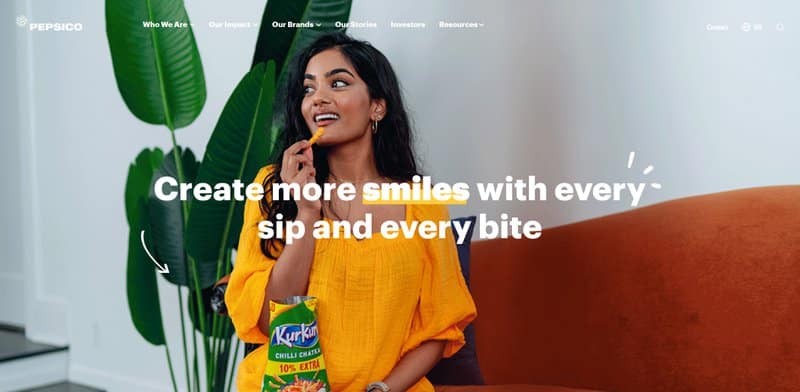
PepsiCo is a North American headquartered company manufacturing and commercializing non-alcoholic beverages, snacks, and foods. The company is one of the world's leading fast-moving consumer goods companies and owns 22 brands worldwide.
- Market Cap (Sep-01-2021): 216.150 Billion USD
- Annual Revenue in USD: 70,370 Million USD (Year Ending: Dec-2020)
- Annual Net Income: 7,120 Million USD (Year Ending: Dec-2020)
- Number of Employees: 263,000 (2019)
7) Philip Morris International
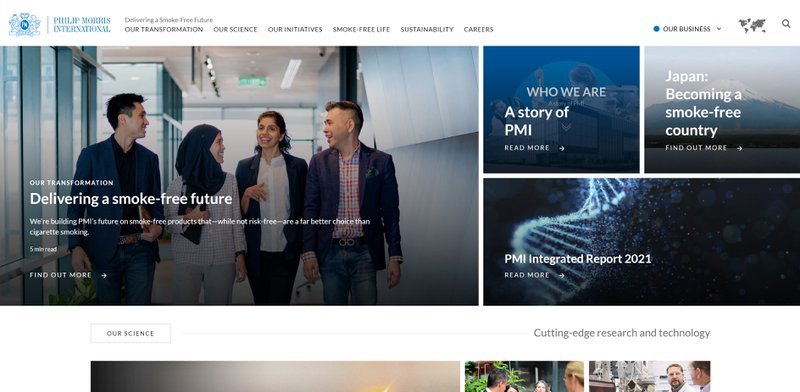
Philip Morris International Inc is a leading international tobacco manufacturing company owner of 15 brands in 180 countries and headquarters in the USA.
- Market Cap (Sep-01-2021): 160.530 Billion USD
- Annual Revenue in USD: 28,690 Million USD (year ending in Dec-2020)
- Annual Net Income in USD: 8,030 Million USD (year ending in Dec-2020)
- Number of Employees: 71,000 (2020)
8) Unilever Group
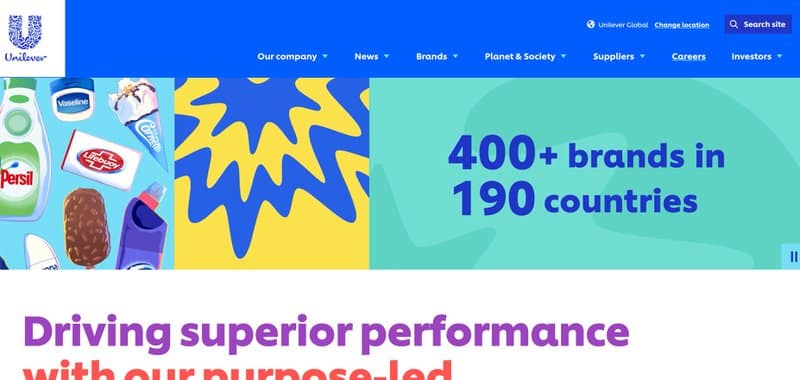
Unilever has its headquarters in the UK and is one of the largest fast-moving consumer goods companies in beauty & personal care, home care, and food & refreshment segments.
- Market Cap (Sep-01-2021): 145.300 Billion USD
- Annual Revenue in USD: 59,850 Million USD
- Annual Net Income in USD: 6,529 Million USD
- Number of Employees: 149,000 (2020)
9) Christian Dior
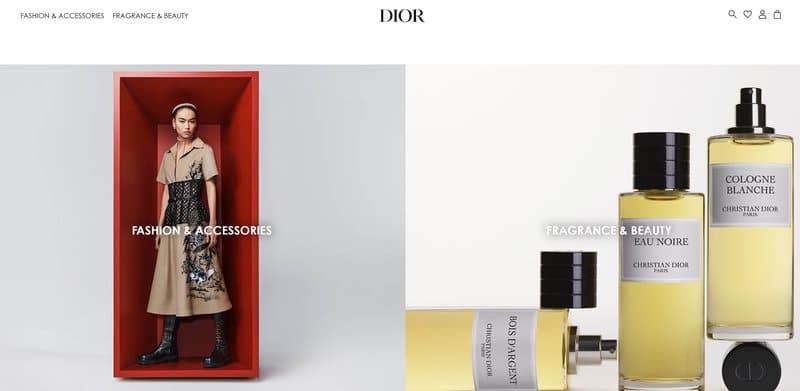
Christian Dior was founded in 1946 by French fashion designer Christian Dior. It's one of the top luxury brands globally and just sells shoes and clothing in Dior stores. The company has its headquarters in Paris, France.
- Market Cap (Sep-01-2021): 139.230 Billion USD
- Annual Revenue in USD: 63,331 Million USD (Year Ending Dec-2019)
- Annual Net Income in USD: 3,437 Million USD (Year Ending Dec-2019)
- Number of Employees: 163,309 (2019)
10) Anheuser-Busch Inbev
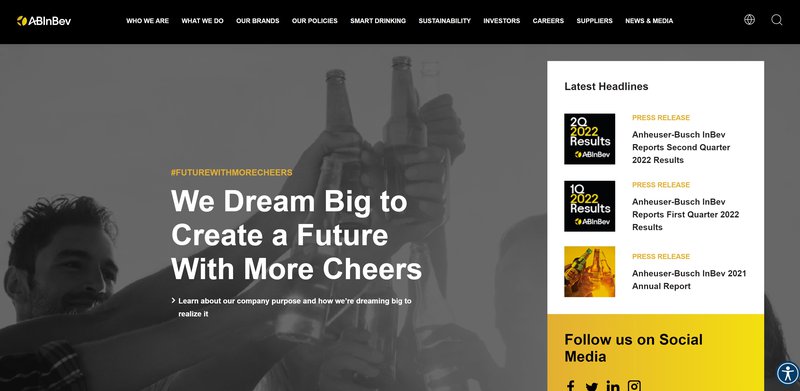
AB-Inbev has more than 630 brands. The company manufactures beer predominantly and has its headquarters in Belgium.
- Market Cap (Sep-01-2021): 123.700 Billion USD
- Annual Revenue in USD: 46,880 Million USD (Year Ending: Dec-2020)
- Annual Net Income in USD: 1,400 Million USD (Year Ending: Dec-2020)
- Number of Employees: 170,000 (December 2019)
Looking at these companies mentioned above, you can ask yourself whether consumer non-durables are a good career path. We started understanding why our previous answer was yes. All of these companies have well-known daily consumed and loved brands.
Job Opportunities in the Biggest Consumer Non-Durable Companies
You find many good options when looking for jobs in the soft goods industry. Companies like Procter & Gamble allow you to have an international career, and there are other huge companies like PepsiCo and Coca-Cola to choose from.
But before you make a decision, you must know what it is like working for these companies. As a job seeker, you must see what a job opportunity brings.
And it would be best if you analyzed what benefits you can get when working for companies like P&G and PepsiCo. Only then should you make a decision!
First, you must understand the nature of the job opportunities available. The biggest soft goods companies have a lengthy screening process. They also have job openings in different career areas. It would be best if you knew all about it!
By the time this article ends, you will better understand working in a soft goods company! After all, you must be aware of the range of opportunities available. We will then move on to aspects like salaries, benefits, and perks.
Types of Jobs at Consumer Non-Durables Companies
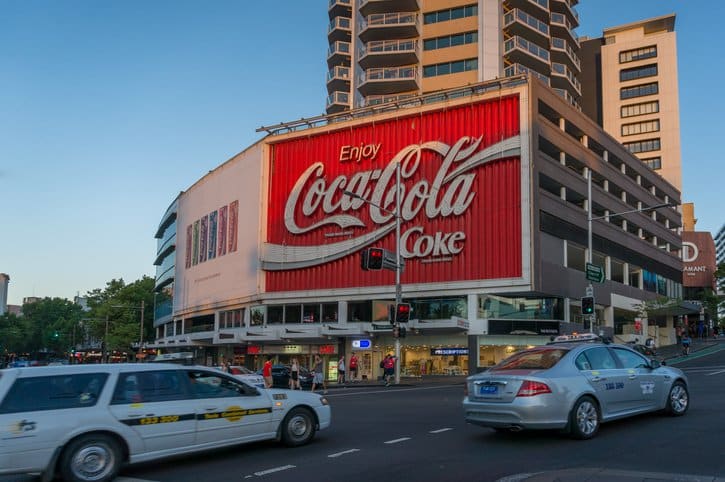
Jobs in the soft goods industry are available in various profiles. There are many opportunities in sales and marketing in companies like Coca-Cola, and there are also technical jobs in the IT departments of big soft goods companies.
You can also find consumer non-durable jobs in the communication and HR departments. So, there is no shortage of variety regarding job opportunities.
You can apply for full-time positions and internships. You can visit the company's website to find ways to apply or search for summer jobs. Doing summer jobs at soft goods companies can give your career an excellent start.
Is consumer non-durables a good career path? Let's continue reading about the essential aspects of consumer non-durable jobs.
All You Need to Know About Top Consumer Non-Durables Jobs
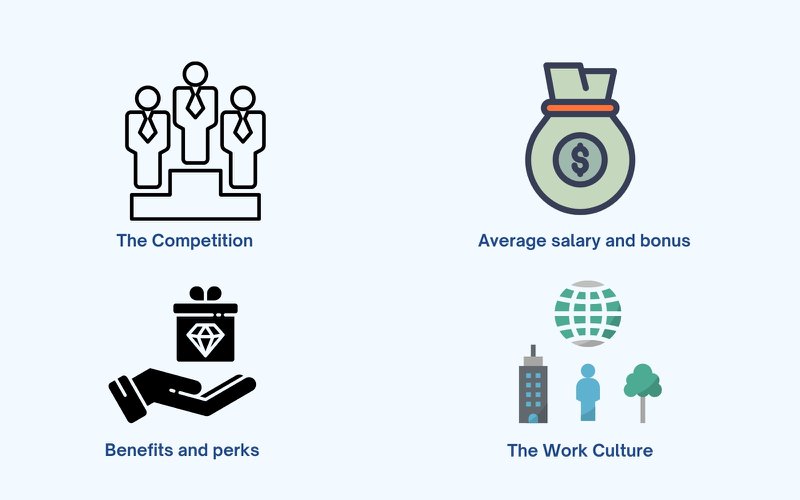
First, we will talk about the pay structure in these companies. After all, the salary is one of the most significant factors in any job. Then we will talk about benefits and perks.
We will start by looking at the average salary for employees in soft goods companies. The average salary is a good indicator of how lucrative working at a company is. We will be looking at the most prominent soft goods companies.
Job Positions
There are many job positions you can start on consumer non-durables. Since they are generally a multi-brand corporation, you will find small divisions by brand.
Procter and Gamble, for example, separate its job opportunities into nine areas.
Brand & Marketing
Different brands require different marketing focuses. It makes sense to have several brand management positions coming along with related marketing functions.
- Brand Management / Marketing
- Communications
- Consumer & Market Knowledge
- Design
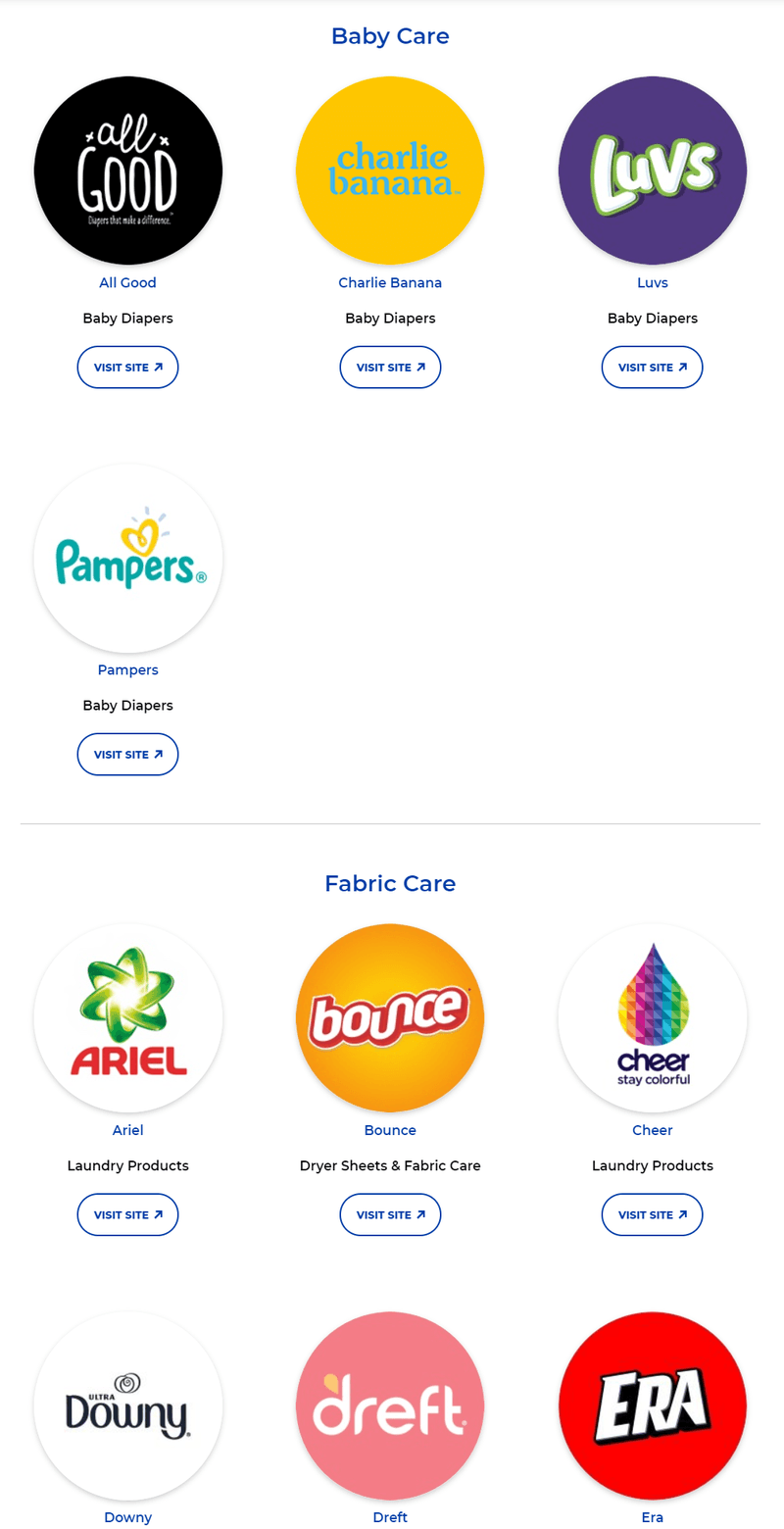
Research & Development
As many different brands on the consumer non-durable products company have various products, the R&D would be separate and require separate packaging, manufacturing technology, and quality control. That's why these types of jobs are plenty in this industry. Below are the positions related to the R&D area.
- Design
- Engineering
- Science
Product Supply
- Engineering
- Manufacturing
- Purchasing
- Quality Assurance
- Supply Chain & Logistics
Sales
In sales, we can observe a different trend for consumer non-durable companies. They usually have the same salespeople since the clients, such as supermarkets, are the same.
Therefore, salespeople will deal with different product types, from detergent to chocolates.
Other Supporting Areas
As with any regular corporation, the support areas are similar. They are also very interchangeable with other industries as well. You will probably have more chances of moving to a career in oil and gas or technology from current non-durable products if you are in finance than working in marketing. Below are the most common support areas:
- Information Technology
- Finance & Accounting
- Human Resources
- Legal / Intellectual Property
- Additional Career Areas
The Competition
Getting a job at these big non-durable companies is tough, and you will face tough competition right from the beginning of the screening process. Coca-Cola's interview difficulty level is at 2.8%, which is moderate difficulty.
Procter & Gamble also has a thorough assessment process. They conduct background checks on candidates to see if they will be a good fit at P&G.
The company gets upwards of 900,000 applications yearly for only 5,000 job openings. As you can see, the competition is tough.
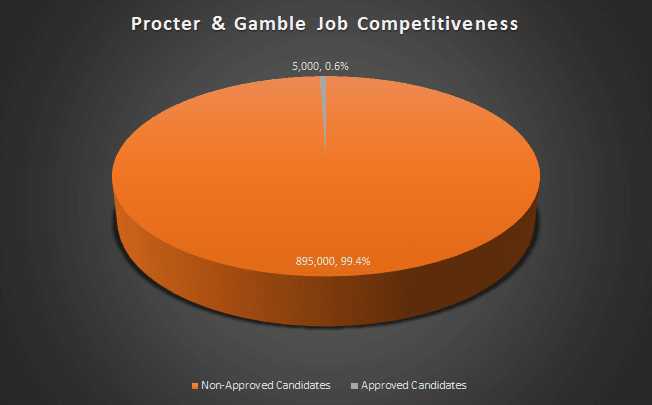
PepsiCo also runs a background check on candidates. If you want to work for big soft goods companies, expect the hiring process to be lengthy. Multiple background checks are in the best interests of the company.
Are you preparing for an interview at a big soft goods company? Make sure you approach it with confidence. Remember, you might have to go through several interview phases. And every interview will be different from the last.
Getting a job at a big consumer, non-durable company is hard, but you can do it! After all, thousands do it every year! All you need to do is trust your preparation.
The Average Salary and Bonus
According to a job salary/job search website, the average base salary at Procter & Gamble is $87k/year, and the same at PepsiCo is $79k/year. And Coca-Cola slides between the two at $82k/year.
Regarding the bonus, Coca-Cola gives its employees an average of $12k/year, while P&G and PepsiCo average $6k and $8k, respectively. Remember, these are average salary figures, and your salary will differ based on your job profile.
As we can see, consumer non-durable products jobs are relatively well-paid. And if you plan to search for a career in this industry, you may have a reliable job with attractive pay. But there are other aspects to consider as well. So, let's move on to factors such as perks.
Benefits and Perks
The biggest companies are worried about their employee's well-being, and the same goes for the most prominent soft goods brands. As a result, employees get a bunch of worker perks and benefits.
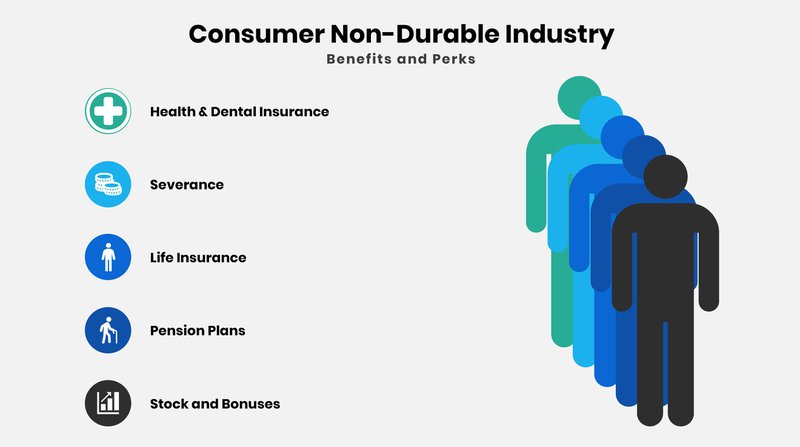
Coca-Cola provides a lot of health insurance benefits. These benefits include severance pay and health and dental insurance. Companies like P&G also offer pension plans to their employees. They provide other perks like well-equipped gyms and fitness classes at specific locations.
PepsiCo also provides health and life insurance to its workers. They also offer stock bonuses and pension plans, which are a part of their efforts at employee well-being.
Apart from these, employees also get minor benefits like paid sick leave. The most prominent consumer non-durable companies provide wholesome training to their new employees, suitable for those looking for long-term jobs at big companies.
Companies like Nestle also focus on providing a flexible work environment. Nestle also provides relocation expenses to their employees. They also have a Maternity Protection Policy for primary caregivers of newborns.
Concerning perks and benefits, a career in consumer non-durables will be fulfilling. After all, every job seeker wants to work for a company that values them.
The Work Culture
The work culture at all these big companies is intense. Employees work with pace and purpose as they know their roles. Employees at Coca-Cola get rewards if they perform well over a while. Things like this inspire healthy competition among colleagues.
Nestle invests a lot in giving leadership training to their managers, and they have also begun training their employees on the new Corporate Business Principles. Some of the training courses at Nestle are mandatory for all employees to take.
All the top consumer non-durable companies value diversity, and they encourage individuals from across the globe to come together and work with them. It also serves the company's interest to understand its consumer base better.
Another reason to work at the most prominent soft goods companies is that employees also get international exposure when working for these companies. After all, the most extensive soft goods companies serve worldwide.
Active Work Culture and an International Career

What comes to mind when you think of your career? Do you think about growth in terms of skills? Consumer non-durables can be a good career path for you. As we saw, there are various job opportunities available.
The most significant soft goods companies pay special attention to their employees. Their training structure is good that produces hard-working employees willing to adapt.
Leadership training also helps them become future managers. Such training programs can help you advance in your career.
Working at top soft goods companies also gives you international exposure. Many young people look for an opportunity to spend time working across the globe. If you are one of them, jobs in the soft goods industry can be the way.
The work culture at top soft goods companies is also intense. For those looking for a competitive work environment, it works wonders. After all, healthy competition is a must if you want to grow as a professional.
Regarding average salary, soft goods companies are a good choice. As we saw, the top companies do not differ much in terms of the average wage per year. You will also get a bunch of essential employee benefits and perks.
Top Paying Jobs in Consumer Non-Durables
The consumer non-durable industry pays for some jobs well; here we list the best ones.
- Creative Director
- Quality Assurance Manager
- Human Resources Manager
- Information Security Analyst
- Food and Beverages Manager
- Financial Analyst (Pharmaceuticals)
- Chemical Engineer
- Medical Sales Representative
- Digital Designer
- Restaurant General Manager
In the article below, we go into more detail about these jobs. Take a look if you think any of them is a good position for you: Best Paying Jobs in Consumer Non-Durables.
Is Consumer Non-Durables a Good Career Path? You Can Make an Informed Decision Now!
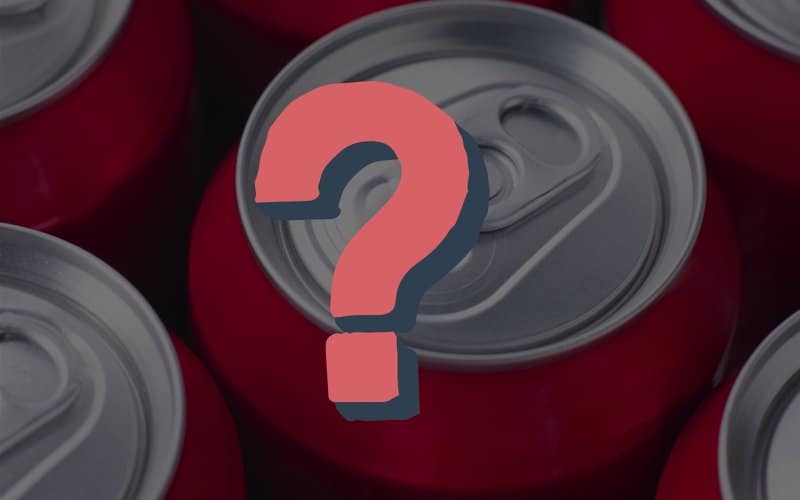
Is consumer non-durables a good career path? The choice is yours to make. Our job is to help you get a better perspective. To help you understand these jobs better.
Now that you have read through it, the picture must seem more straightforward. You know about the salary you may get at top consumer non-durable jobs and the various career areas you can apply to.
There are soft goods jobs in sales and marketing, areas with the highest openings every year. But you can also apply in HR or IT departments in soft goods companies.
Besides the chance of getting international exposure, the training programs can also turn out to be helpful in the long run.
So, what are the aspects that appeal to you? What do you want your career to be like? After all, it boils down to your preferences.
With all the information we have given you, it must be easy to choose. Remember to consider all the points when making a decision! Good luck!
Bonus: What About Services? Is Other Consumer Services a Good Career Path?
Generally, services are sold to final consumers instead of companies such as supermarkets or restaurants. In many cases, some goods are sold to consumer services companies. First, let's take a look at what are the consumer services areas:
- Restaurants
- Travel
- Events
- Insurance
- Finance (Bank, Loan institutions)
- Creative Services (Marketing, Design, etc.)
- Retail
- Among Others.
If you're searching for a career in consumer services, you must know that the time and shift hours may change. Usually, restaurants and retailers work on weekends, for example.
Consumer services offer an accessible entrance to start your career, and they will always be in demand. If you are a college student, working in a restaurant can be a profitable way to pay bills and learn new knowledge to give you more experience for future job interviews.
If you think about corporate careers in consumer services, such as marketing or finance, your professional life should be similar to other industries. Keep in mind some of them are interchangeable and make your employability high.
Think about someone who is a marketer at DICK'S Sporting Goods. This person has different opportunities to work in the industry side and in marketing agencies that would provide services for them.
If you ask, "is Other Consumer Services a Good Career Path?". The answer is it depends on your goals in life and for your career, but it's, in general, a good entrance path for your professional career.
Bottom Line
For several reasons, someone might choose to pursue a career in the consumer non-durables industry. First, there is consistently high demand for these products, which can lead to job stability. Additionally, many jobs in this field require skills that can be easily transferred from one company to another.
However, one potential drawback is that profit margins on non-durable goods can be slim compared to other industries due to factors such as cost fluctuations for raw materials or transportation expenses.
In the end, is consumer non-durables a good career path? After learning all the industry and career details, the answer is a resounding “yes”.
If you want to know more about other career paths, check out this list on Totempool. You can make your choices with solid information before moving to a particular industry.
As more industries are published on the website, we will keep updating the list for you. If you want to learn how to choose your career path, check out this article.

Christian has over ten years of experience in marketing agencies. Currently, he has been dedicating his time to a tech startup and also writing for major publications. He loves podcasts and reading to keep up with the latest trends in marketing.
